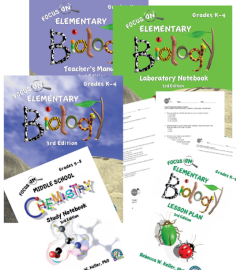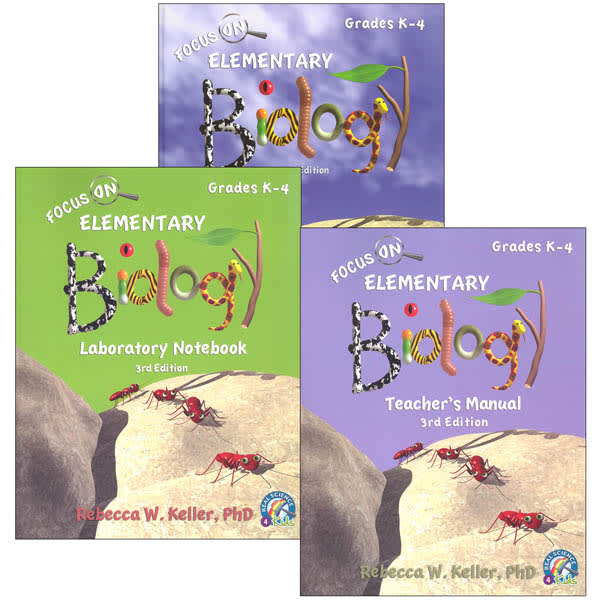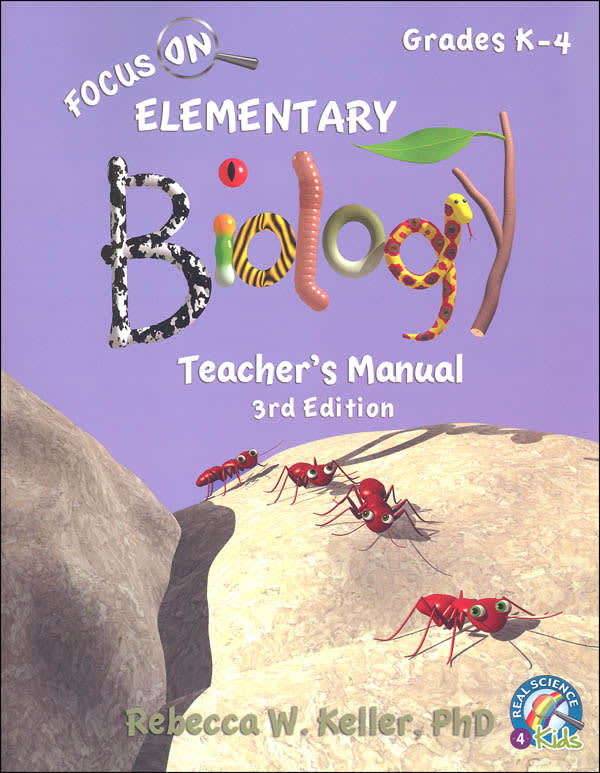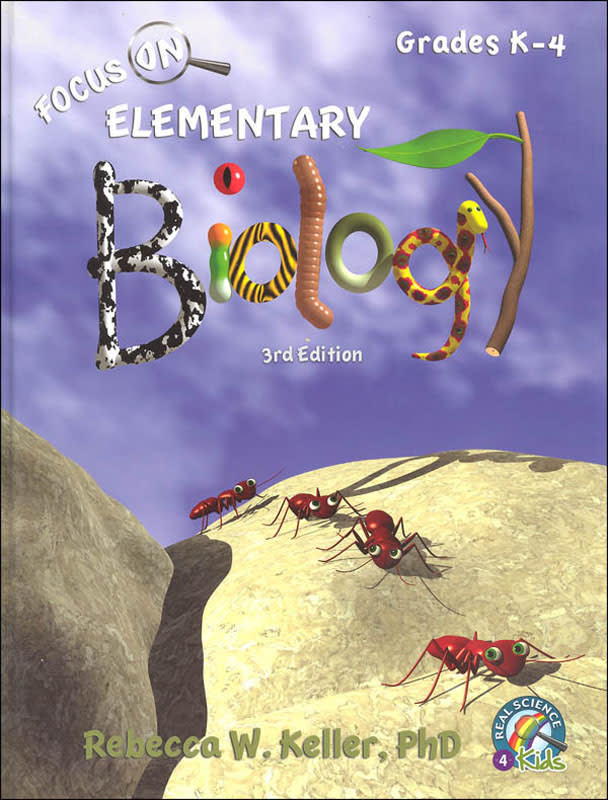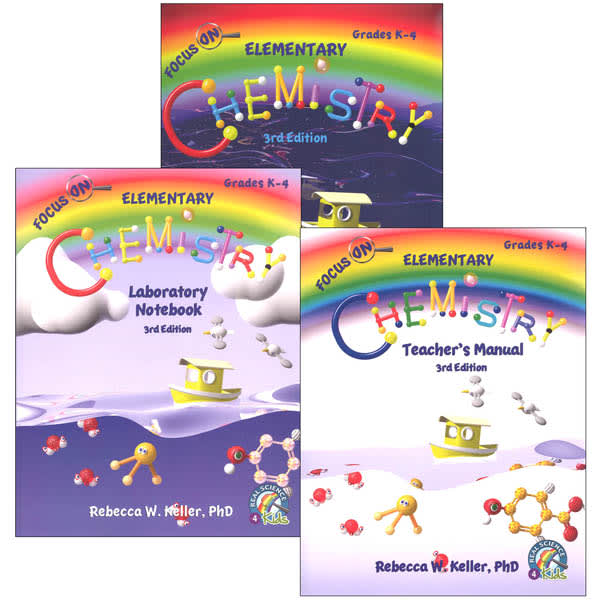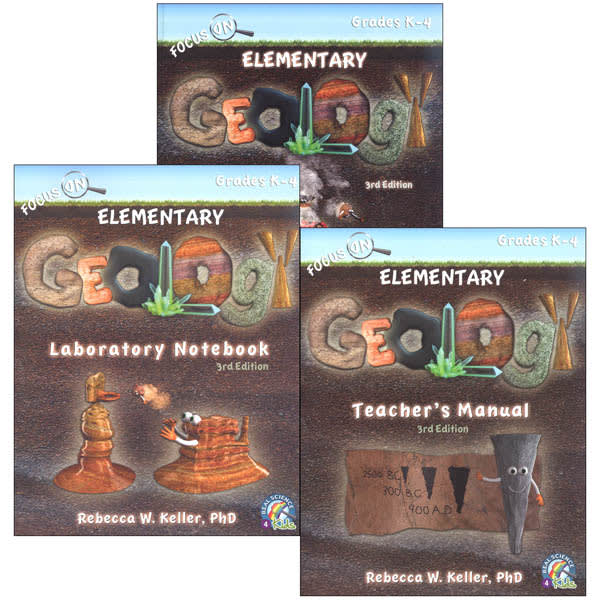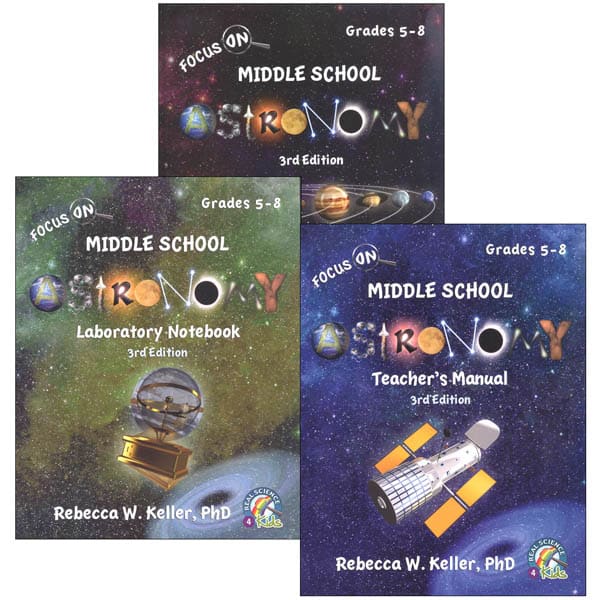Real Science 4 Kids was created by Dr. Rebecca Keller (AKA Dr. Rebecca Woodbury) in response to the needs she discovered while homeschooling her own children. Because of her strong background in science (Ph.D. in biophysical chemistry and former research assistant professor), Dr. Keller wanted a secular science curriculum with solid content that children would enjoy. Not finding what she wanted, she decided to create it herself—and it's not just one program, but two: the Focus On series that I review here and the Real Science-4-Kids series. (Some information is repeated in both reviews because of common features.)
The Focus On series differs from typical science programs available for students up through sixth grade because of its single-discipline approach for each course. Its five core science disciplines—chemistry, biology, geology, astronomy, and physics—are addressed by cycling through them with two series of courses at two different levels: elementary and middle school. The titles read Focus On: Elementary Chemistry, Focus On: Middle School Biology, etc. The elementary books are written for students in kindergarten through fourth grade, and the middle school books are for grades five through eight. The courses build upon one another to some extent, so you should check the publisher’s website for their suggested sequence for using the courses.
For each course, there are three essential components: the student textbook, a laboratory notebook, and a teacher’s manual. There are also two optional components that are provided as PDFs: a study notebook and a packet of tests.
Textbooks
The full-color textbooks in the Focus On series each have 12 chapters, with the exception of the Elementary and Middle School Biology textbooks which have 16 chapters each. The expectation is that students will complete one chapter per week. So you should easily be able to complete two courses per school year.
Each course covers a lot of material and gives a solid introduction to the topic. Instruction is supported by plenty of colorful illustrations. Occasionally, there are activity suggestions within the lesson plans that relate topics to other academic subject areas such as math and language arts.
All of the textbooks follow a similar general outline that begins with the history of its core scientific discipline in the first chapter and the tools used for its study in the second. (Students learn about the scientific method through both textbooks and laboratory activities.) The rest of the textbook’s chapters each address a specific topic within the discipline. For instance, Focus On: Elementary Biology covers the nature of life, how different life forms are categorized, the cell, and all sorts of living creatures from viruses and bacteria to plants and animals.
Each chapter concludes with a summary and a section of questions labeled “Some Things to Think About.” Some of the questions have predictable answers, while others are open ended. There are no answer keys for these questions.
The elementary-level textbooks are challenging, especially if you use them with students below third grade. While the explanations are simplified for younger children, the elementary textbooks include words and terms such as acid-base reaction, indicators, chromatography, chloroplast, protozoa, and paramecium (Focus On: Elementary Biology and Focus On: Elementary Chemistry).
You need to use discernment in selecting courses for kindergartners, and first graders who are still learning to read and write might be easily overwhelmed. While there is space for students to write observations and thoughts about the lab activities, they are often instructed to draw rather than write. Younger students might also need to dictate some responses for someone else to write.
I’d probably start the elementary courses in second grade, since younger children are unlikely to have the reading or writing skills to be able to complete the laboratory notebook or the study notebook without a lot of assistance. Gifted students might begin the courses at younger ages.
The courses for middle school significantly ramp up the level of difficulty. Also, math is incorporated into science, something that frequently doesn't happen until high school in other science courses. Similarly, laboratory activities are challenging in the elementary level courses and are more so for the middle school courses.
Laboratory Notebooks and Teacher’s Manuals
In the laboratory notebook for each course, there is one experiment or observation task for each of the textbook's chapters, and each experiment or observation has a number of sections. First, students are given questions to answer that help them think about the topic. Then they will perform one or more steps of an experiment or observation. Then they will draw pictures or write about what they observed or discovered. Each laboratory notebook task concludes with an explanation and an optional follow-up experiment under the heading “Just for fun.”
The teacher's manuals are primarily focused on the laboratory activities. A list of materials you will need for each experiment is at the very beginning. Then the manual lays out a lesson presentation for each activity, including the questions to discuss. For all experiments, the needed resources are mostly household items or those that are easy to find. However, there are occasional exceptions, such as the purchase of a microscope to be used for both levels of biology. Each of the laboratory notebook activities is supposed to be completed in one day according to the lesson plans, but some of them, such as growing mold and sprouting beans, will definitely take longer.
Study Notebooks and Tests
The study notebook for each course is optional, and they differ greatly for the two levels. Study notebooks for the elementary courses serve as vehicles for reinforcing and reviewing the material in each chapter in a notebooking fashion. They have full-color pages, with activities such as filling in blanks, drawing, writing, cutting and pasting, and assembling mini-books. The instructions have students use a file folder to create a cover for this notebook, but you could just as well put the pages into a thin binder. These study notebooks might make recording and studying information more appealing for some students.
The study notebooks for the middle school courses are much more open ended. They have black and white pages that give prompts for additional research and writing, offer opportunities for creative thinking, provide space for students to draw, and encourage students to explore ideas about science in a way that is not graded or evaluated in a traditional fashion.
The test packet for each course has two mid-terms, a final exam, and answer keys.
The study notebooks and tests are available only as PDFs directly from the publisher.
Supplemental Books
Real Science 4 Kids has also published many small, colorful information books on specific topics, such as Atoms, DNA, Molecules, Photosynthesis, Sea Jellies, and Wheels on a Bike. There are 14 of these supplemental books for biology topics, 10 for chemistry, and 8 for physics. (None are available for geology and astronomy.) They are sold individually or as sets. They fit in very well alongside the elementary courses for those areas of science.
Summary
The Focus On series offers substantive and challenging science instruction up through eighth grade. It also meets the needs of those looking for a more neutral approach in regard to religious beliefs. The combination of illustrated instructional material with hands-on activities should make challenging science topics easier for students to understand. This series does require teacher preparation and presentation time. Even so, it should be easy for parents without much science background to teach.





